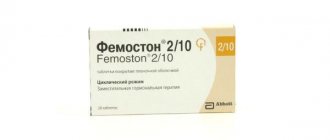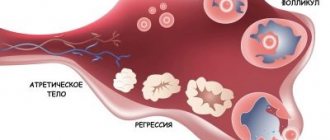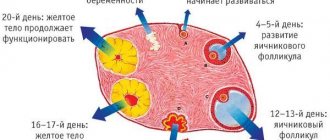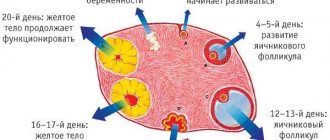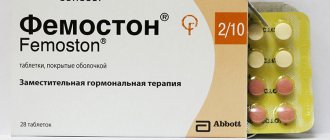- inflammatory diseases of the genital organs;
- disruption of hormone production or excessive abuse of birth control pills;
- changes in the functioning of the thyroid gland;
- violation of diet (obesity or sudden weight loss);
- low quality of life: chronic fatigue, stress, lack of sleep, poor nutrition.
Now let’s look at whether ovulation can be absent during normal periods? Yes, it can, in such situations:
- for girls who are just getting acquainted with adult life, this process is just starting;
- in women before menopause approaches, when the process of egg production has already subsided:
- in young mothers after childbirth;
- the entire period of breastfeeding: follicle development is blocked by prolactin.
There is an opinion that immediately before menstruation a few days or after, pregnancy is impossible due to the absence of a mature cell. But this is a misconception. Ovulation immediately after menstruation with a regular cycle is quite possible. There is always a chance of conception, provided you do not use protective equipment. After all, the egg, under the influence of certain factors, matures at a different time, and sperm remain active for up to 5-7 days (they live in the genital tract).
We have selected a video for you that details cases of ovulation immediately after menstruation:
Description of the drug
Medicine has long stepped forward. If earlier even menstrual irregularities could not be treated, now more serious things can be corrected with the help of certain medications. Femoston refers to hormone replacement therapy. HRT itself causes stress to the female body, but sometimes there are cases when it cannot be abandoned.
Femoston is often prescribed for menopause. The medicine consists of estradiol and a substitute for natural progesterone - dydrogesterone. The first substance is responsible for compensating estrogen, and the second is responsible for replenishing progesterone.
There are three types of Femoston available in pharmacies:
- 1/5;
- 1/10;
- 2/10.
The tablets also contain excipients. So, they contain:
- silica;
- magnesium stearate;
- lactose monohydrate;
- starch;
- hypromellose.
If we talk about the use of the drug at the stage of pregnancy planning, then the opinions of doctors differ radically. Some are convinced that taking it stimulates the conception of a baby, while others believe that the release of an egg and fertilization is possible only after stopping the pills.
Ovulation can be controlled to increase your chances of conceiving
Author Alexandra Balan-Senchuk
28.09.2019 15:06
Health » Obstetrics and gynecology
Since ovulation (from the Latin ovum - “egg”) is an important part of the female menstrual cycle, the ability to stimulate or suppress ovulation plays an important role in women's health. This is obvious for those people who have difficulty conceiving as ovulation can be controlled to increase the chances. It also plays a big role in the process of in vitro fertilization.
Induced ovulation
Induced ovulation is a process that involves taking medications to stimulate the maturation of an egg and increase the chance of pregnancy. Both stimulation of the egg and induction of ovulation are different processes, but they are closely related, as they are necessary for the fertilization of the egg and the occurrence of conception.
This is especially important for patients with conditions such as polycystic ovary syndrome and oligomenorrhea who do not ovulate regularly as other women do. This can help them conceive a child when it would otherwise be impossible.
Physiologically, ovulation is caused by the release of luteinizing hormone. The most commonly used medical technique to stimulate the release of an egg involves ovarian stimulation followed by an injection that accelerates hormonal changes to cause ovulation.
A low dose injection of human chorionic gonadotropin induces ovulation 24-48 hours after injection. This method is widely used but carries the risk of ovarian hyperstimulation syndrome.
Suppressed ovulation
Suppressing ovulation is a way to control contraception. If ovulation does not occur, the egg is not released and cannot be fertilized.
Hormone therapy is used to interfere with ovulation and birth control. It is usually aimed at suppressing ovulation using the female sex hormones estradiol and progesterone. They mimic the body's hormonal levels after menstruation to provide negative feedback to the ovaries and suppress ovulation.
In addition, for women undergoing in vitro fertilization (IVF), it is important that spontaneous ovulation does not occur.
Risks of Induced Ovulation
Throughout the ovulation induction process, regular ultrasounds and tests are performed to monitor hormones. However, there are some risks for women who undergo this procedure, such as:
- Damage to the endometrium.
- Ovarian hyperstimulation syndrome with symptoms of nausea, bloating and excessive weight gain.
Photo: elblogdetubebe.com
Dosages and rules of use
Femoston 1/5 is also known to pharmacists as “Femoston conti”. It contains the smallest amount of estradiol (1 tablet – 1 mg). Dydrogesterone here does not exceed 5 mg.
The instructions for use say that the medicine is used continuously, that is, it is necessary to drink a full course. Only one capsule is usually prescribed per day. It must be taken at the same time. As for the attachment to food, it is absent.
If the patient for some reason misses taking the drug, he has no more than 12 hours to correct the situation. Otherwise, it is better to skip a day. For menopause, Femoston is prescribed one year after the last menstruation.
Femoston 1/10 – this contains exactly 10 mg of estradiol and dydrogesterone. One package is valid for 28 days. It contains two types of capsules: white ones contain estradiol, and gray ones contain estradiol and dydrogesterone. The drug is prescribed from the 15th day of the cycle. You need to take the medicine for 2 weeks (type 1), and the next two weeks (type 2).
Does Duphaston suppress ovulation?
To put it simply and briefly - no, it does not suppress, but only if you do not exceed the dose of 30 mg per day. If the dosage is exceeded, Duphaston suppresses ovulation. Let's look at this issue in more detail.
In cases where a woman wants to get pregnant, but is unable to do so, doctors prescribe the drug Duphaston, which is an artificial analogue of the natural hormone progesterone. Typically, artificial progesterones are created based on the male hormones testosterone. Taking such drugs often entails certain androgenic changes. For example, a woman’s voice may become rougher or excess hair may appear on her body. Women taking Duphaston do not observe such changes, since the drug is based on another substance - dydrogesterone.
Duphaston is prescribed to women with progesterone deficiency. Moreover, the appointment can be without preliminary tests, because the lack of the hormone is manifested by obvious external signs. Typically, with progesterone deficiency, gynecologists are consulted with the following problems:
- infertility;
- risk of miscarriage;
- painful periods;
- irregular monthly cycle;
- relapses of miscarriage;
- absence of menstruation.
Positive Impact
As we have already found out, Femoston contains a whole complex of female sex hormones. Dosages correspond to those in which they are produced naturally in the ovaries. However, what about those who do not produce these substances independently? Then a full course of treatment is prescribed.
During menopause, the functions of the ovaries practically cease to be performed. There are cases when these organs are removed according to doctor's indications. Femoston helps prevent various negative changes in the body that can occur due to the lack of sex hormones. If they do occur, the degree will be less pronounced.
The drug helps prevent physical, autonomic and psycho-emotional changes:
- tides;
- heat;
- problems in the functioning of the cardiovascular system;
- decreased uterine tone.
How to avoid getting pregnant during ovulation
Women who monitor their cycle using calendar calculations or special tests know their “safe” days when pregnancy cannot occur, and freely have sex on these days without contraceptives. But, if the cycle is irregular, you need to remember that fertilization, theoretically, can occur on any day.
On the days of ovulation, when the risk of becoming pregnant is greatest, if the birth of a child is not planned, special attention should be paid to the safety of sexual intercourse. The most common and at the same time unreliable method of protection is interrupted sexual intercourse. Another ineffective and simple method is douching. A hot bath practically does not protect against pregnancy.
A more effective remedy is lubricants that kill sperm already in the vagina. This type of contraception requires rapid use, since within 2 minutes after entering the woman’s body, the sperm can reach its goal and fertilize the egg. Protection guarantee – 80%.
Of the most effective means, the most popular are condoms and hormonal contraceptives. In addition, there are also intrauterine devices, hormonal implants for women, female condoms, birth control suppositories and the contraceptive patch. In each individual case, contraception is selected individually.
Effect on egg release
How are Femoston and ovulation related? Can this remedy be used when an egg is released? From a theoretical point of view, it contains estrogen and progesterone, so endometrial growth resumes. For this reason, tablets are often prescribed for the treatment of infertility, when insufficient thickness of the mucous membrane or hormonal imbalance is detected.
Appropriate therapy is not always effective and is not widely used. Duphaston is usually prescribed because it is better tolerated by the female body.
Statistics say that 50% of patients experience a long-awaited pregnancy after a course of treatment. Their own ovulation was restored after Femoston.
Proginova - ovulation assistant.
In addition to progesterone, estrogens are also responsible for a woman’s reproductive health. For estrogen deficiency, the drug Proginova is often prescribed. Prescribed to women who, due to low estrogen levels, face the following health problems:
- infertility;
- malignant formations;
- increased hair growth;
- nervous disorders.
There is an opinion that Proginova suppresses ovulation in the same way as Duphaston. And here, too, you need to delve into the details to understand how everything really happens.
A common reason for a woman’s inability to get pregnant is that the endometrium is too thin. Thanks to the Proginova technique, this tissue becomes denser, and the fertilized egg can attach to the wall of the uterus. However, some women claim that this drug caused them to suppress ovulation. This can happen for two reasons. The first is that the drug was combined with another drug containing estrogen, resulting in an overdose effect. The second reason is excessive compaction and thickening of the endometrium, which prevents fertilization.
Contraindications
There are cases when tablets cannot be taken, since there are many contraindications:
- porphyria;
- thromboembolism;
- disruption of normal blood circulation in the brain;
- endometrial hyperplasia;
- lactation and pregnancy;
- breast cancer;
- bleeding from the uterus of unknown origin;
- high degree of sensitivity to the active substance.
In general, it is not recommended to take the drug for patients under 18 years of age.
Signs of lack of ovulation
Every girl should know about anovulation and the signs of this problem. Anovulation with regular periods should attract attention. Especially when planning pregnancy, prescribing oral contraceptives and taking certain medications. Signs that indicate that the ovulatory phase has not occurred are presented below:
- no changes in basal temperature;
- no changes in the composition of vaginal discharge;
- unchanged size and density of the mammary glands;
- delay of menstruation or the onset of heavy and very painful menstruation.
Conclusion
Thus, Femoston is a drug that compensates a woman for progesterone and estradiol if the ovaries cannot produce these hormones on their own. The effect of Femoston on the body is very great, just look at its side effects, ovulation is also affected. It must be used continuously and only with the permission of a doctor. As for the effect of Femoston on ovulation, it is present, so it is better to choose another drug for the treatment of infertility.
Causes of anovulation.
- Hypothalamic-pituitary disorders, accompanied Hyperprolactinemia or a violation of secretion by the pituitary gland Gonadotropic hormonesregulating folliculogenesis and ovulation, with normal levels of Prolactin (Prl) in blood.
- Lack of ovulation with Hyperprolactinemia may be the result of the direct effect of an excess amount of Prl on the ovaries, inhibition of the Gonadotropin-secreting function of the pituitary gland with blocking of the spontaneous peak of Luteinizing Hormone (LH) secretion, inhibition of the release of Gonadotropin-releasing hormones in the hypothalamus.
- The secretion of gonadotropic hormones at a Normal level of Prl in the blood may be disrupted due to a change in the rhythm of neurosecretion of Gonadotropin-releasing hormones in the hypothalamus , a decrease or cessation of their production during anorexia and a sharp drop in body weight, the absence of neurons in the hypothalamus, tumors of the hypothalamic region, etc. The level of gonadotropic hormones in the blood may remain normal or decrease. A sharp decrease in the content of gonadotropin hormones in the body, leading to anovulation, is often observed after surgical or radiation treatment of pituitary adenomas.
- Anovulation can be a consequence of hyperandrogenism (adrenal, ovarian, mixed), because with an excess of androgens, the secretion of gonadotropic hormones is inhibited. In polycystic ovaries, anovulation is caused by a violation of the hypothalamic-pituitary and ovarian mechanisms of ovulation.
What to do if there is no ovulation?
The treatment regimen is determined by the gynecologist on an individual basis. Treatment is directed to the cause of the lack of ovulation. If it is the presence of a sexually transmitted infection, antibacterial therapy is carried out. The drug is selected based on the causative agent of the disease. If you are in stressful situations for a long time, taking sedatives is indicated. The lack of iodine is compensated by taking vitamin and mineral complexes. Lack of ovulation due to hormonal disorders is treated with appropriate hormone-based medications.
Where to get tested for prolactin and treat infertility in St. Petersburg, prices
Timely tests and adequate measures are a guarantee that a woman facing the problem of increased prolactin will restore ovulation and infertility will be a thing of the past. You can take hormone tests and get a consultation with an experienced gynecologist-endocrinologist in St. Petersburg without a queue and inexpensively at the specialized gynecological clinic Diana.
The price of an appointment with a gynecologist is affordable for every patient - the initial appointment costs 1000 rubles, and the appointment based on the examination results is only 500 rubles. Taking blood for analysis will cost 170 rubles.
MAKE AN APPOINTMENT, TEST OR ULTRASOUND
If you find an error, please select a piece of text and press Ctrl+Enter
Symptoms and signs of ovulatory disorder
Signs of lack of ovulation may include general clinical manifestations. These are disruptions in the menstrual cycle - a complete absence of uterine bleeding or specific bleeding several times a month.
Long, painful and heavy menstruation is due to hormonal imbalance when the uterine cavity expands. There may be scanty bleeding, similar to menstruation.
If the cause of the ovulatory cycle disorder is polycystic ovary syndrome, then the signs will be excessive body hair due to excess progesterone, acne, and rapid weight gain. With an increased level of the hormone estrogen - mastopathy.
Impossibility of conception. Even if the process of fertilization occurs, the uterus is not able to support the growing embryo - spontaneous rejection of the fetus occurs.
During ovulation, libido may increase. Basal body temperature increases by 0.5-1 degrees. Irritability and nervousness appear. Discomfort in the lower abdomen, especially at the site of follicle rupture.
What is prolactin
The content of the article
Prolactin is a hormone produced by cells in the pituitary gland, the endometrium (the lining of the uterus), the ovaries and, if a woman is pregnant, the placenta. Exceeding the norm of prolactin is called hyperprolactinemia.
.
This condition is dangerous not only due to infertility. Complications of hyperprolactinemia:
- disruption of the functioning of all human endocrine glands - ovaries, adrenal glands, pituitary gland and thyroid gland;
- loss of vision;
- malignancy of benign pituitary tumors.
A significant excess of the hormone level ends with the cessation of menstruation - amenorrhea. And this is not only infertility, but also early menopause.
Also, increased prolactin is the cause of other dangerous diseases, for example, mastopathy. The hormone causes the formation of ducts in the mammary glands and their clogging (if there is no pregnancy). The week with mastopathy will end with surgery.
How to prepare for prolactin tests
The hormonal system works according to special rules. The production of hormones is affected by the time of day, moral state, sexual activity, etc. This means that in order to obtain accurate results of a prolactin test, it is necessary to exclude any influence of factors unusual for the usual lifestyle.
Before donating blood you need:
- Avoid stress, taking antidepressants and alcohol, thermal procedures, incl. hot bath, smoking;
- Postpone sexual intercourse and taking hormonal medications;
It is recommended to take tests for prolactin on an empty stomach, in the morning in the first 3 hours after sleep. The most accurate result can be obtained in the first phase of the menstrual cycle.
These recommendations do not mean that blood for prolactin cannot be tested in the evening or in another phase of the cycle. If the condition requires urgent examination, you can take an analysis urgently and, if there are real deviations, then clarify it. This will enable the gynecologist to confirm the preliminary diagnosis or refute the presence of hyperprolactinemia.
